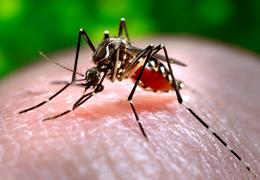Editor's Note: Dengue fever infects around 100 million people in the tropics each year. Some sources say the disease is fatal for 40,000 people a year while the article below says 12,500. I don't know who is doing the counting! Dengue is a mosquito-borne disease that is passed from one infected person to another via the bite of the Aedes aegypti mosquito. Outbreaks occur throughout Asia, Africa and Latin America. The resulting fever ranges from mild to severe and is sometimes fatal, particularly if it goes untreated and internal hemmoraging results. Severe cases can include hemorrhagic fever, which involves high fever, hemorrhaging, and sometimes circulatory failure. Infants, children, the elderly and those with compromised immune systems are particularly vulnerable.
At the clinics here in Venezuela, rehydration via IV fluids is commonly used. Venezelans also use coconut water which is a natural isotonic beverage to restore and maintain water and electrolyte balance. The Venezuelan government has been very aggressive with prevention and treatment of the disease. One means of prevention is to avoid having open containers of water around. The mosquitos breed in clean water much more than in dirty. Symptoms often begin with a mild fever and then come the headaches (often severe), muscle and joint pains, weakness and rash. The work of Scot O'Neill and his team, described in the article below, looks very encouraging for stopping or inhibiting the spread of dengue fever.
Sources: Better Medicine, Chemical Blog Store
Another source for this information is my own unwanted personal experience! I'm not an infant, child (well, some might say that's arguable), nor do I have a compromised immune system. So that leaves only one other possibility - I must be getting old!)
- Les Blough in Venezuela
Wolbachia strain halts virus in mosquitoes.
 |
|
A bacteria can stop Dengue-fever-carrying Aedes aegytpi mosquitoes from transmitting the virus.
James Gathany/CDC |
A common bacterium that infects mosquitoes is showing promise as a way to control the spread of dengue fever.
Transmitted by the mosquito Aedes aegypti, dengue fever kills around 12,500 people a year. Unlike for malaria, bed nets are not effective in combating dengue as A. aegypti is active during the day. And concerns about rising resistance to insecticides has spurred the search for alternatives.
A team led by Scott O'Neill, a geneticist at the University of Queensland in Brisbane, Australia, believe they may have the answer. In work published in Nature today, they reveal a strain of the bacterium Wolbachia pipientis that can stop the dengue virus from replicating in its mosquito host. They go on to show that this bacterium can rapidly spread through wild A. aegypti populations, suggesting it could be a viable control mechanism for dengue fever.
"The presence of Wolbachia in mosquitoes completely blocks the ability of the dengue virus to grow in mosquitoes," O'Neill says.
First principles
In previous work, O'Neill and his colleagues showed that infecting female mosquitoes with the Wolbachia strain wMelPop-CLA could cut their lifespan by half. The aim was to fight dengue fever by killing infected mosquitoes early, before the virus could mature enough to be passed on to people. But this approach, which also reduces infected mosquitoes' rate of reproduction by 56%, is problematic, as it also limits infected mosquitoes' ability to pass the bacterium on.
The solution, the group reports today, could lie in wMel. In caged field experiments, mosquitoes infected with this strain had lifespans, reproductive rates and offspring viability similar to that of uninfected controls.
Further, the team did not find virus in the saliva of wMel-infected females, suggesting that the bacterium could block transmission of the disease. And, because it does not harm mosquitoes, the bacterium is more likely than its predecessor to spread successfully through wild populations.
"It's an environmentally friendly approach that does not affect the mosquitoes, just the virus," says Flaminia Catteruccia, a molecular entomologist at Imperial College London, whose work has focused on controlling the malaria-carrying mosquitoes Anopheles gambiae.
How wMel stops the virus from replicating is "not fully understood", says O'Neill. But he says mounting evidence suggests that the bacteria "compete for limited sub-cellular resources required by the virus for replication".
Into the wild
In an open field trial in two relatively remote areas in Australia, the team released more than 300,000 adult mosquitoes infected with the wMel Wolbachia strain into wild A. aegypti populations over a period of 9–10 weeks. Five weeks later, nearly all the wild mosquitoes tested were infected.
"This is the first case where wild insect populations have been transformed to reduce their ability to act as vectors of human disease agents," the authors write. They now plan to run large trials over the next 2–3 years to test the approach in countries where dengue fever is endemic. If the trials go well, their method could be implemented as a control mechanism "immediately afterwards", says O'Neill.
References
Walker, T. et al. Nature. (2011)
Hoffmann, A.A. et al. . (2011)
Source: Nature News

